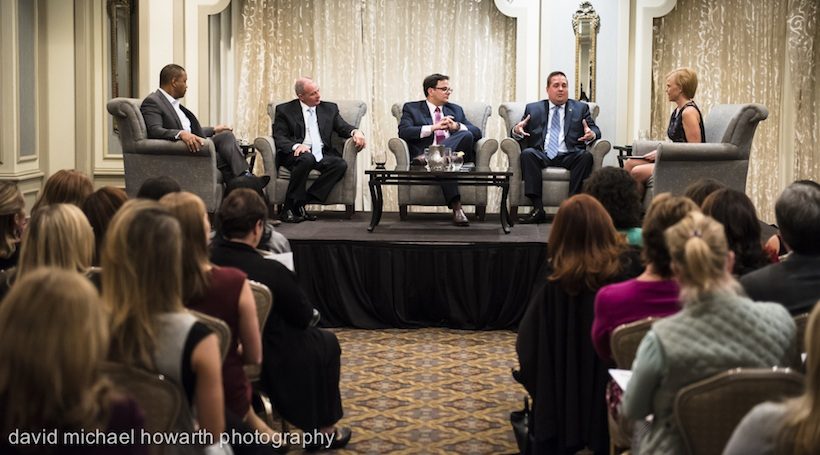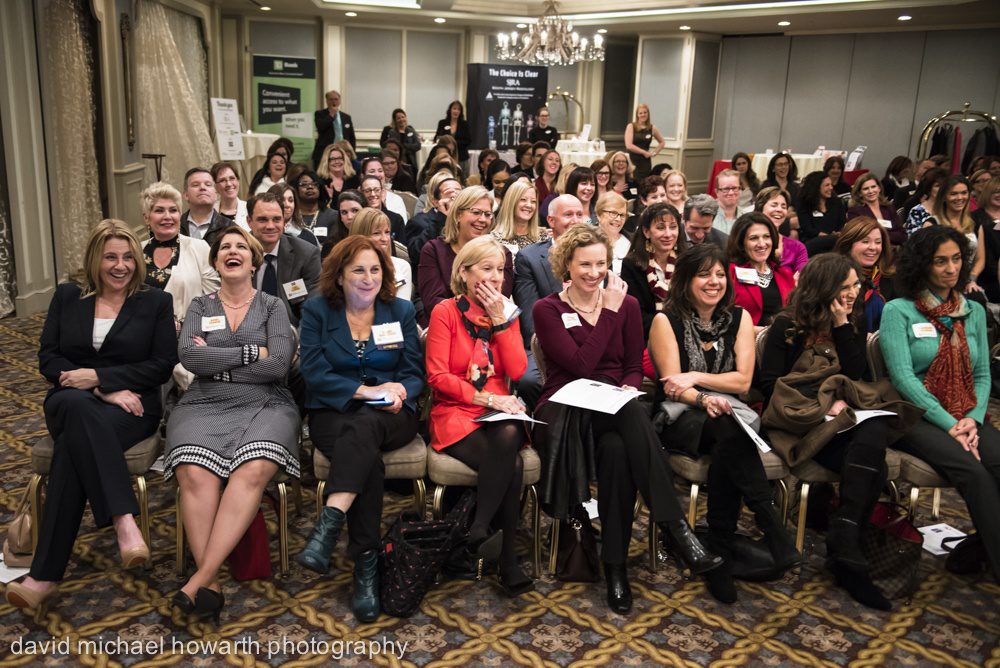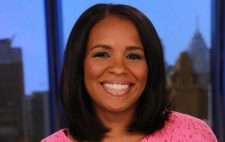Photography by David Michael Howarth
Don’t miss our 2017 Women’s Empowerment Series! Click here for the latest panel.
We tried something different this year – gathering a panel of men to talk to an audience of women about women in business. It was a risk. We had no idea what would happen. But in the end, the night was extraordinary. Four successful men were open, honest and direct as they discussed their experiences with women in the workforce. It was a night that just might go down in SJ history.
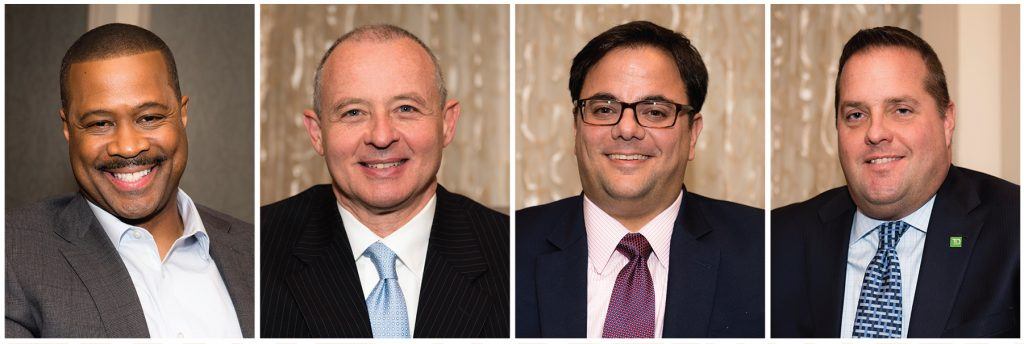
Panelists
Rick Williams
Anchor, 6ABC
Vincent Maione
Region President, Atlantic City Electric
Anthony Mazzarelli, MD, JD
Senior Executive Vice President, Cooper University Health Care
Rob Curley
South Jersey Market President, TD Bank
The female population at work…
Historically, we’re a male-dominated industry, but that’s changed over the years. The group I work with directly now, we’re about 70/30, male to female proportion, in leadership roles. In a physical work role, it’s more like 99/1, male to female.
–Vince Maione
We take women’s empowerment very seriously at our bank. When I look at my specific team, I probably work and interact with about 40 to 50 people on a daily basis, and it’s probably about 50/50, men versus women.
In banking – 10 years ago and beyond – it was a male-dominated industry, especially in commercial and small-business lending. Women were more on the retail side. But now I can tell you in commercial and small business banking, women have made a major impact. Two of my best relationship managers are women. They are two of my smartest people, two of my best, and they work harder than most.
–Rob Curley
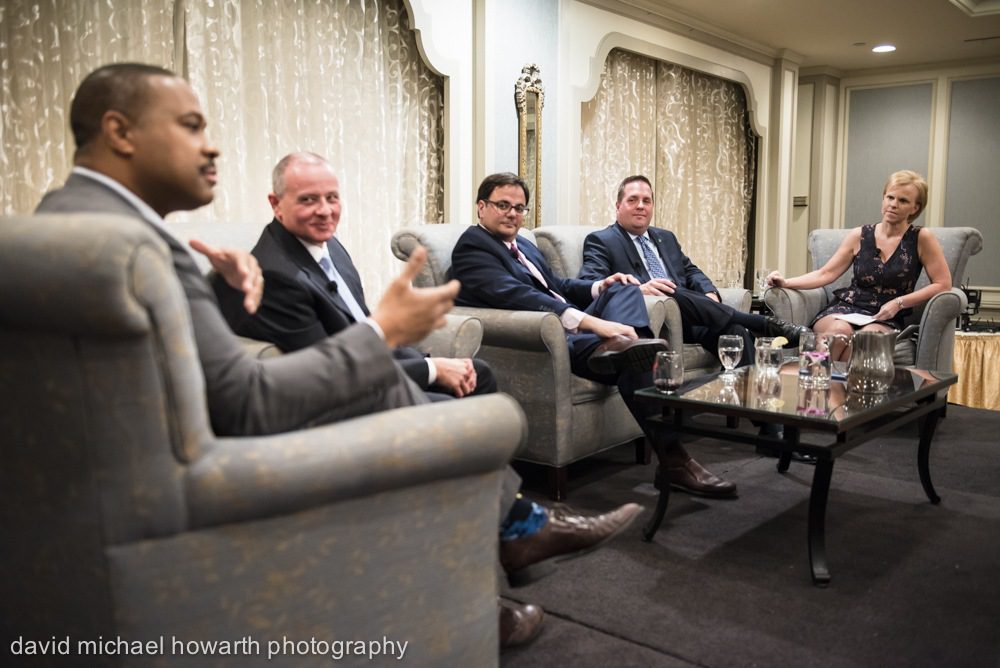 Hospitals are traditionally run by nurses, which is a female-dominated industry. But even though we traditionally have more women in hospitals, really it’s men who have dominated the C-suite, which is where I work, but not at Cooper. We once had a leadership that was all men, and now we’re mostly all women. Our CEO is a woman. That’s a big switch.
Hospitals are traditionally run by nurses, which is a female-dominated industry. But even though we traditionally have more women in hospitals, really it’s men who have dominated the C-suite, which is where I work, but not at Cooper. We once had a leadership that was all men, and now we’re mostly all women. Our CEO is a woman. That’s a big switch.
–Anthony Mazzarelli
Years ago, on the 6 and 11 o’clock Action News, it was three white men: Jim Gardner, Gary Papa and Dave Roberts. And then we hired Cecily Tynan, who was the first meteorologist in the city. Slowly but surely, the look of 6 ABC started to become more diverse. In our news department we now have maybe 150 people, I would say half of them are women – and many are in management.
–Rick Williams
Witnessing sexism…
I was in a meeting with men and women, and one of the gentlemen made a comment that didn’t feel right to me. I pulled him aside and said, “Look, that was a little inappropriate. You should be more sensitive to what you’re saying, because you don’t know what people’s personal situations are.” He respected that, and he actually reached out to the women and apologized.
–Rob Curley
I think women have been conditioned to accept inappropriate or off-color comments. They don’t want to be that person who calls someone out, so they’ll react how they think they’re supposed to react. That signifies acceptance by all the males in that group, and then they just continue to do it. In that situation, whether you’re male or female, if you’re uncomfortable about what’s going on, don’t act like you’re comfortable, because you will just continue to create the same environment.
–Vince Maione
If a woman said something off-color, it wouldn’t upset me. I don’t know if that’s sexist or not, but it wouldn’t upset me. But if a man said something to a woman, then that would be offensive.
–Vince Maione
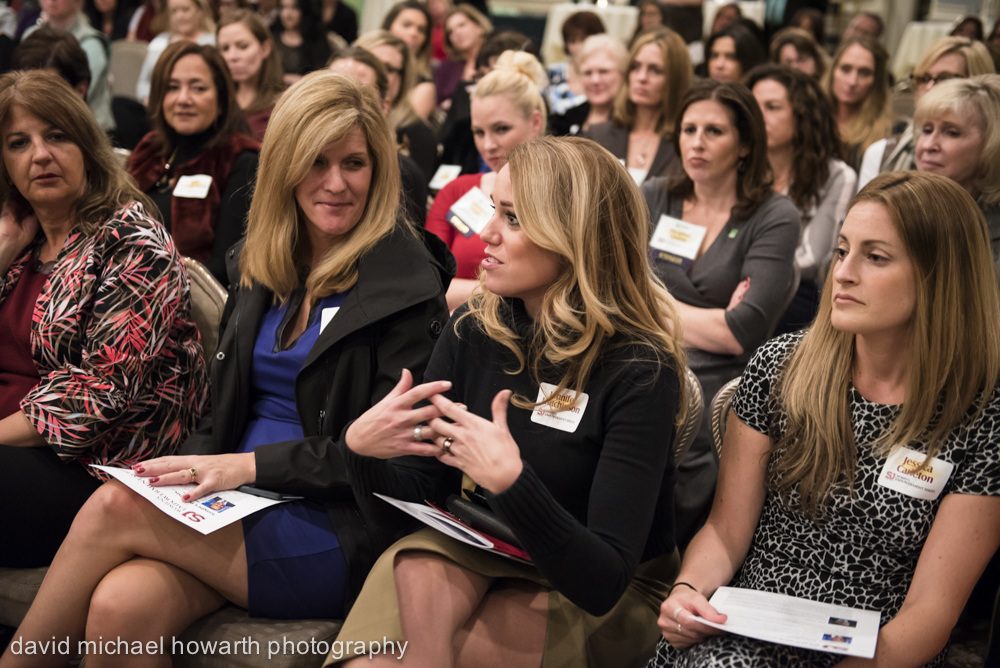
Promoting equality in the workforce…
A leader has to take a leadership role. If they don’t and they condone inappropriate behavior, it’s never going to get better. Somebody has to step up.
–Vince Maione
It comes down to the culture of the organization. I would hope my team of women would feel comfortable coming to me or my boss and say, “You know what, so and so said something inappropriate, and it really made me uncomfortable.” We would handle it appropriately. But if you don’t have that culture, then obviously people are going to be afraid to raise their hands.
–Rob Curley
When a woman cries at work…
I had to talk to a female employee about something that wasn’t going very well with her performance, and she started to cry. I froze for a minute. But then I kind of made a joke out of it. I thought of Tom Hanks in “A League of Their Own,” and I said, “There’s no crying in banking.” And she immediately stopped and smiled, and that was the end of the crying.
–Rob Curley
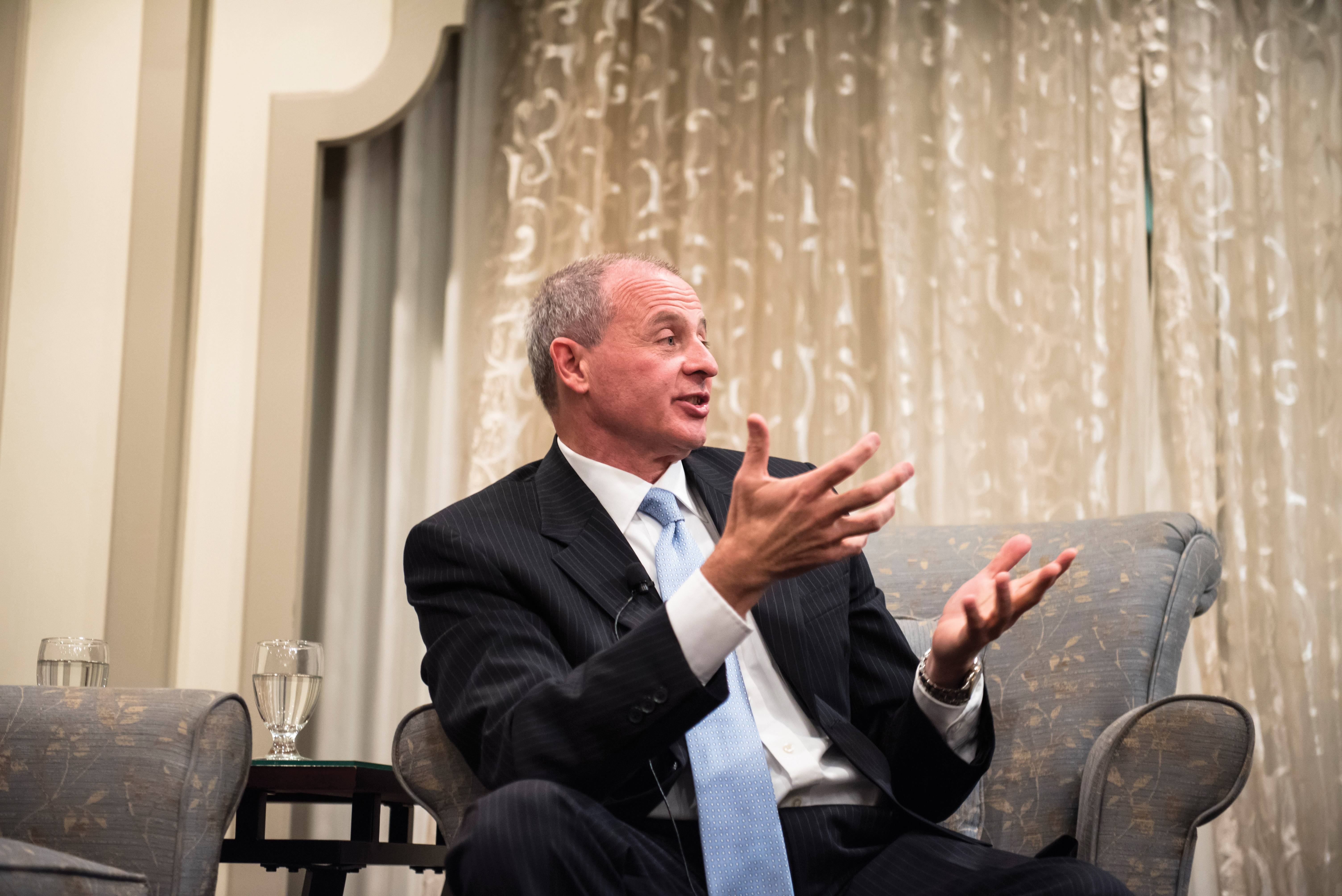 There’s a lot of crying in medicine, so I have a box of tissues on my window sill. We have people who work with life and death, and I’m in a culture where men and women cry. The way I look at it is if I can create a safe enough place where that’s the stress relief someone has, that doesn’t matter to me, as long as it’s an appropriate place. I’ve created that safe place for them.
There’s a lot of crying in medicine, so I have a box of tissues on my window sill. We have people who work with life and death, and I’m in a culture where men and women cry. The way I look at it is if I can create a safe enough place where that’s the stress relief someone has, that doesn’t matter to me, as long as it’s an appropriate place. I’ve created that safe place for them.
–Anthony Mazzarelli
Dealing with sexist men…
I had an executive come to me after she was brutally berated by a man, but to her credit, she wanted to continue on and follow up with this gentleman to let him know he didn’t get to her. That’s what I tried to tell her: Don’t avoid him. Let that person know you haven’t been beaten. They will berate you to see if they can get their way. Whatever you do, don’t back down.
–Vince Maione
Experiences that shaped their thoughts on women in business…
When I was 8 years old, my parents got divorced. I distinctly remember my mother being in my room telling me we had $8 left, and she didn’t know how she was going to put food on our table. But then she said, “But I’m going to do something about it,” and she went into an industry that was very male-dominated: commercial real estate development. She became one of the most well-known real estate people in South Jersey. I saw how hard she worked. And I think because of that, I’ve never really looked differently at men and women in leadership positions.
–Rob Curley
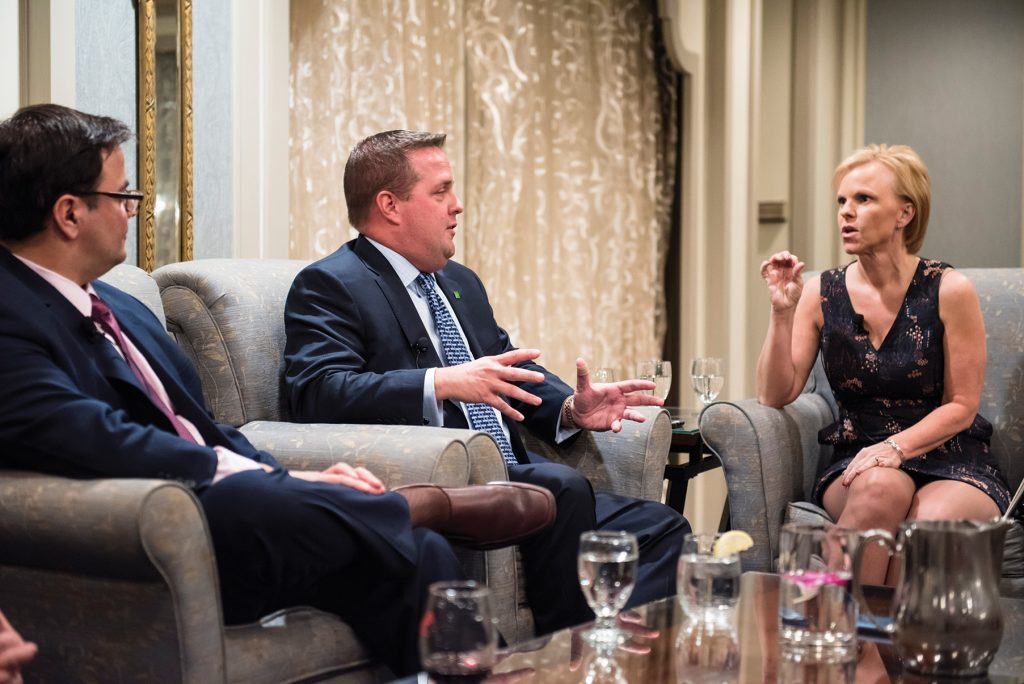 My wife is a cardiologist at Cooper. And when she was pregnant for the first time, she was a little delinquent in filling out her paperwork with HR. I remember someone from HR contacting me, asking me to answer a few questions. My wife called back HR, telling them, “Listen, from now on, all questions about my vagina come to me.”
My wife is a cardiologist at Cooper. And when she was pregnant for the first time, she was a little delinquent in filling out her paperwork with HR. I remember someone from HR contacting me, asking me to answer a few questions. My wife called back HR, telling them, “Listen, from now on, all questions about my vagina come to me.”
–Anthony Mazzarelli
I grew up in a mostly Italian family, so I go to Italy once in a while. There, the men would sit at the table and the women would run around to serve the men. I thought that was nice when I was a kid. But as I got older, I didn’t see why anybody should serve someone else because they’re a certain gender. I took that into my personal life and my business life, where I treat women the way they should be treated. If you carry yourself well, you’re smart, intelligent or articulate, that should get you as far as any man. It’s not about your gender. It’s about what you bring to the table.
–Vince Maione
On a woman’s appearance at work…
I work with women all the time, and they have it tough because men, we just have to put on a suit, but women, they have to be fashionable. And thanks to social media, the women find out very quickly if how they look is successful or not.
–Rick Williams
I’ve had times where people have come to me and said, “You should probably say something – her outfit is too revealing for work.” I outsource that responsibility and find a woman to speak to her. I’m not trying to avoid the responsibility, but I don’t want the conversation to be misconstrued. It’s usually about the outfit being overly sexy. So, you know, me having a conversation about someone’s breasts could be taken another way.
–Anthony Mazzarelli
Assertive women…
It’s OK for a woman to be a woman. You don’t have to be perceived as a guy in a male-dominated world and try to be aggressive or vindictive or cutthroat. If you’re confident because you know what you’re doing, that will get you further than if you try to be someone you’re not.
–Vince Maione
In my work environment, it is the more assertive, aggressive women who tend to rise to the top. Sometimes there will be a story where a woman will have to ask the tough questions to get the story or try to beat out the other stations. Those women command the most respect in our newsroom, because it’s such a competitive industry.
–Rick Williams


